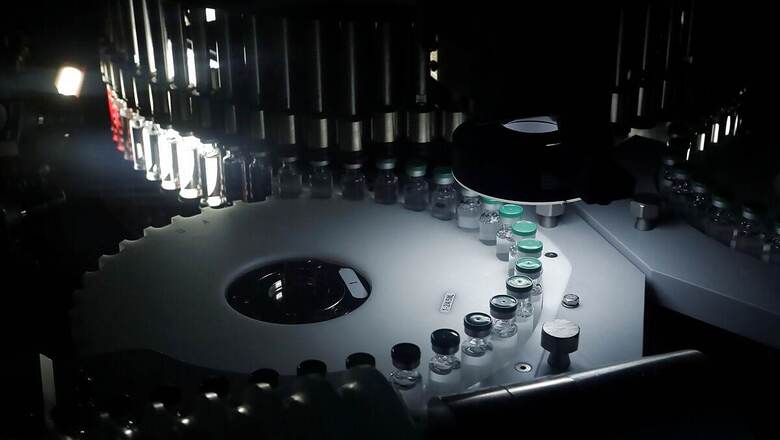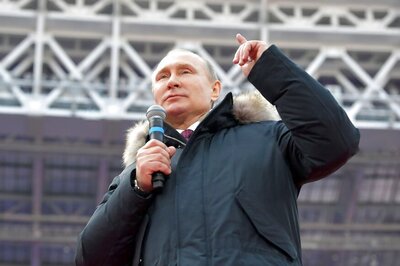
views
US President Joe Biden and Vice-President Kamala Harris assured India of providing all assistance, including urgently sending necessary medical life-saving supplies and equipment, to help the country combat the deadly coronavirus crisis. India has been facing a surge in Covid-19 infections, with the daily case count touching 352,991 on Monday. The country recorded 2,812 deaths on Monday.
Pressure had been mounting from several quarters on the US to allow export of key raw materials for the manufacture of Covid-19 vaccine to India. Finally, on Sunday, the Biden administration issued a statement that US National Security Advisor Jake Sullivan spoke to National Security Advisor Ajit Doval on Friday and offered to deploy resources and supplies to boost the production of Covid-19 vaccines. He also said US will supply rapid diagnostic test kits, ventilators and Personal Protective Equipment (PPE) to India. The announcement came after Britain, France and Germany pledged aid to India over the weekend.
Here’s what the US will send to India and how it will help in the Covid-19 fight:
What are these raw materials that the US is sending? Why are these raw materials important?
The White House, in its statement on Sunday, said the US “has identified sources of specific raw material urgently required for Indian manufacture of the Covishield vaccine”. It didn’t specify what the raw materials it was sending were. US Surgeon General Dr Vivek Murthy, too, tweeted: “Aid extended by the U.S. to India includes… Raw material for vaccine production…”
https://twitter.com/JakeSullivan46/status/1386359529865162752?s=20
According to a report by the World Trade Organization with respect to the composition of Covid-19 vaccines, “An average antibody producing plant will use in the area of 9,000 distinct materials sourced from exactly 300 providers across roughly 30 unique nations.”
Adar Poonawalla, Chief Executive Officer of Serum Institute of India (SII), which manufactures Covishield, the AstraZeneca-Oxford University vaccine, had earlier indicated that some of the supplies needed included bags and filters. “There are lot of bags and filters and critical items that manufacturers need. I will give you an example. The Novavax vaccine that we are a major manufacturer of, need these items from the US…,” he was quoted as saying in a report in Economic Times.
According to a report by UK-based think tank Chatham House, in collaboration with the International Federation of Pharmaceutical Manufacturers and Associations, it has been found that shortages in the supply chain could disrupt vaccine manufacturing in a significant way. Among materials that are in short supply are single-use bioreactor bags, cell culture media, viral-vactor, protein-subunit-based Covid-19 vaccines, and single-use filters and glass vials, a report by The Print said.
Read more: US President Joe Biden, V-P Kamala Harris ‘Determined To Help India’ in Fight Against Covid-19
Which vaccines in India need these raw materials?
The US restrictions on raw material exports are likely to hit all Covid-19 vaccine manufacturers. In India, SII makes the AstraZeneca-Oxford University vaccine (Covishield) and plans to also make Covovax in collaboration with Novavax. Hyderabad-based Bharat Biotech manufactures the Covaxin vaccine.
Poonawalla had told The Indian Express that the vaccine industry, outside the US, needs plastic bags, filters and media solutions which are critical in the manufacturing of Covid-19 vaccine.
He has also reportedly said the restrictions have halved the number of doses of Covovax that SII can stockpile. SII had earlier said the restrictions would not affect its current production of Covishield, but “may” impact “the scaling up of Covishield’s future capacity”.
In a Twitter post, tagging the US President, Poonawalla said: “Respected @POTUS, if we are to truly unite in beating this virus, on behalf of the vaccine industry outside the US, I humbly request you to lift the embargo of raw material exports out of the U.S. so that vaccine production can ramp up. Your administration has the details.”
https://twitter.com/adarpoonawalla/status/1382978713302683653?s=20
Dr Krishna Ella, the chairman and managing director of Bharat Biotech, had said late in March that the restrictions by the US “on some of the materials” have impacted supply logistics for vaccine makers.
Why was the US not sending these raw materials so far?
US President Joe Biden and his predecessor Donald Trump had invoked the war-time Defence Production Act (DPA), which leaves US companies with no option but to give priority to the production of Covid-19 vaccines and Personal Protective Equipment (PPEs) for domestic production to combat the deadly pandemic in America, the worst-hit nation.
The suppliers of the Covid-19 vaccines’ raw materials, which is in high demand globally and sought after by major Indian manufacturers, are being forced to provide it only for domestic manufacturers in the US. The Serum Institute of India is the world’s largest producer of the Covid-19 vaccine.
Requests were made and clamour grew against US’s decision to not help India
In recent weeks, India’s Ambassador to the US Taranjit Singh Sandhu has been taking up the matter of allowing raw materials to be exported with the Biden administration officials. During the telephonic conversation between US Secretary of State Blinken and External Affairs Minister S Jaishankar, the two top diplomats also discussed the coronavirus pandemic and ways to deal with it.
What did the US initially say about not helping India?
Defending its restrictions on the export of key raw materials for the manufacture of Covid-19 vaccine, State Department spokesperson Ned Price had said the Biden administration’s first obligation is to take care of the requirements of the American people.
“…the United States first and foremost is engaged in an ambitious and effective and, so far, successful effort to vaccinate the American people,” said Price. “That campaign is well underway, and we’re doing that for a couple of reasons. Number one, we have a special responsibility to the American people. Number two, the American people, this country has been hit harder than any other country around the world more than 550,000 deaths, tens of millions of infections in this country alone.”
It is not only in the US interest to see Americans vaccinated; but it is in the interests of the rest of the world to see Americans vaccinated, he said.
“The point the Secretary (of State Antony Blinken) has made repeatedly is that as long as the virus is spreading anywhere, it is a threat to people everywhere. So as long as the virus is spreading uncontrolled in this country, it can mutate and it can travel beyond our borders. That, in turn, poses a threat well beyond the United States,” Price had said.
What was the announcement made on Sunday after the NSA-level call?
The US, in a statement, said it is working around the clock to deploy available resources and supplies. “The United States has identified sources of specific raw material urgently required for Indian manufacture of the Covishield vaccine that will immediately be made available for India,” said the White House statement.
The statement also said the US has identified supplies of therapeutics, rapid diagnostic test kits, ventilators, and Personal Protective Equipment (PPE) that will immediately be made available for India and it is also pursuing options to provide oxygen generation and related supplies on an urgent basis.
National Security Council spokeswoman Emily Horne said in the statement, “The US Development Finance Corporation is funding a substantial expansion of manufacturing capability for BioE, the vaccine manufacturer in India, enabling BioE to ramp up to produce at least 1 billion doses of Covid-19 vaccines by the end of 2022.”
Will the US be sending just raw material for vaccines or also the additional stockpile of Covishield they have?
The White House statement, which was issued on Sunday, about sending raw material for Covid-19 vaccine to India did not mention sending surplus vaccines. The US has around 30 million doses of the AstraZeneca-Oxford University vaccine, which the Serum Institute of India (SII) manufactures under the name Covishield in India.
There have been voices expressing concern over the US not releasing vaccines from its stockpile for India. Congressman Ro Khanna and Raja Krishnamoorthi had called for the Biden administration to release millions of AstraZeneca Vaccines to hardest hit Covid countries, including India.
https://twitter.com/ashishkjha/status/1385194010227138561?s=20
Eminent public health expert Ashish K Jha, tweeted, “India is in the throes of a horrendous COVID surge. Horrendous. They are struggling to get more people vaccinated. We are sitting on 35-40 million doses of AstraZeneca vaccine Americans will never use. Can we please give or lend them to India? Like may be now? It”ll help. A lot.”
Read all the Latest News, Breaking News and Coronavirus News here. Follow us on Facebook, Twitter and Telegram.




















Comments
0 comment